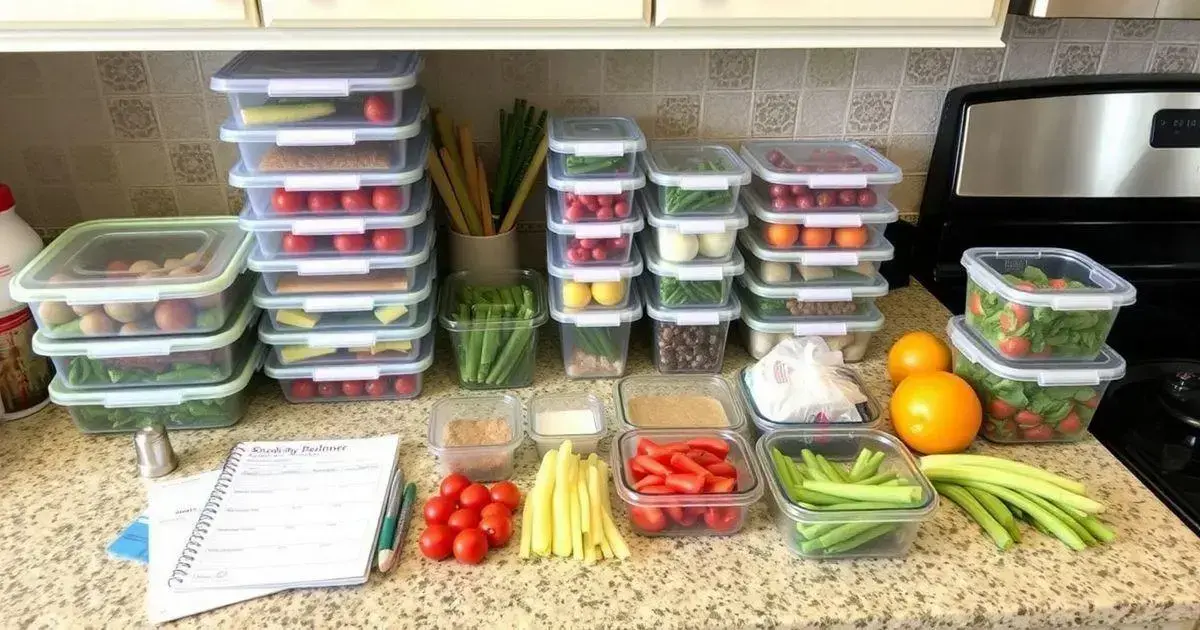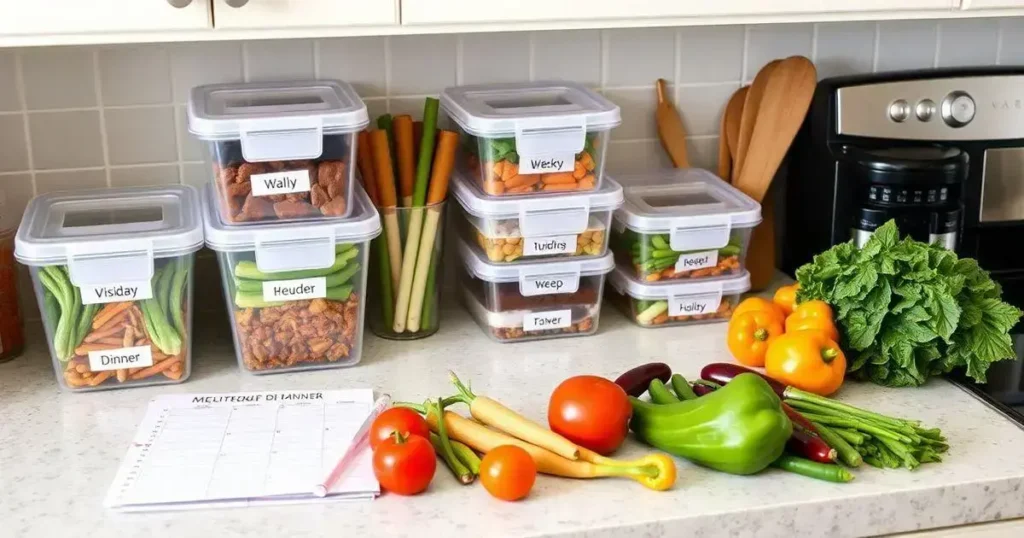How to organize the week’s dinner can transform your meal preparation from chaotic to seamless.
With effective meal planning and organization, you can save time, reduce stress, and ensure everyone enjoys delicious meals throughout the week.
In this article, we will explore essential tips on meal prepping, easy dinner ideas, and how you can get the whole family involved in the cooking process.
Say goodbye to last-minute dinner dilemmas and hello to enjoyable family meals!
Content
ToggleImportance of Planning Weekly Dinners
The importance of planning weekly dinners cannot be overstated. By taking a little time each week to organize your dinner schedule, you can greatly reduce stress and make family mealtime enjoyable.
Meal planning helps you avoid last-minute decisions that often lead to unhealthy takeout or rushed meals.
Benefits of Meal Planning
Planning your dinners for the week has many advantages. First, it saves time. When you know what you’re cooking each night, you can quickly prepare meals without scrambling for ideas last minute.
Second, it helps with budgeting. By planning, you can create shopping lists and only buy what’s necessary, reducing food waste.
Improved Nutrition
Another benefit is improved nutrition. By choosing meals in advance, you can ensure they are balanced and healthy.
This means incorporating grains, proteins, and vegetables, making it easier to stick to dietary goals.
Quality Family Time
Furthermore, planning dinners can enhance quality family time. With meals planned, you can involve everyone in the cooking process, allowing for shared moments and fun cooking experiences together. It makes the dinners more than just eating.
Reducing Food Waste
Lastly, planning your weekly dinners can help minimize food waste. By knowing what meals you’re preparing, you can use ingredients efficiently throughout the week, ensuring everything is consumed before it expires.
This not only saves money but also contributes positively to the environment.
Tips for Meal Prepping on Sundays

Tips for meal prepping on Sundays can make your week much easier. Starting on Sunday helps you organize your meals so you can efficiently manage your time and energy Monday through Friday.
Here are some actionable tips to get you started:
Plan Your Meals
Before you even step into the kitchen, take a moment to plan out your meals for the week. Write down what you want to eat each day. This gives you a clear shopping list and makes prep simpler.
Grocery Shopping
After planning, head to the grocery store. Stick to your list to avoid impulse buys. Make sure to purchase fresh produce, proteins, and whole grains. Shopping on Sundays can help you get everything you need for the week ahead.
Batch Cooking
Batch cooking is essential for meal prepping. Cook large portions of grains, proteins, and vegetables all at once. Divide them into containers for easy access throughout the week. Dishes like stir-fry, taco fillings, and soups are great for batch cooking.
Use Proper Storage
Invest in good-quality, airtight containers. These help keep your meals fresh for longer. Label each container with the date they were prepared to ensure you eat them in a timely manner. Also, consider using freezer-safe containers for items that can stay frozen.
Set Aside Time
Choose a specific time on Sundays to dedicate to meal prepping. Whether it’s a few hours in the afternoon or the evening, having a set time will make it easier to stick to your routine. Consistency is key!
Easy Dinner Ideas for Busy Weeknights
Easy dinner ideas for busy weeknights can help you serve tasty meals without feeling overwhelmed. These quick recipes can be prepared in about 30 minutes or less, making them perfect for hectic evenings.
One-Pan Chicken Fajitas
Simply slice chicken breast, bell peppers, and onions. Toss them with olive oil and fajita spices on a baking sheet. Bake at 400°F for about 20 minutes. Serve with tortillas and your favorite toppings.
30-Minute Pasta Primavera
Cook your favorite pasta and add fresh vegetables like zucchini, cherry tomatoes, and broccoli. Toss with olive oil, garlic, and Parmesan cheese for a delicious, colorful meal ready in no time.
Quick Stir-Fry
Stir-fry is a speedy way to prepare dinner. Use pre-cut veggies and your choice of protein like tofu, chicken, or shrimp. Cook everything in a hot pan with soy sauce or teriyaki sauce for flavor.
Sheet Pan Sausage and Veggies
Arrange sliced sausage, potatoes, and seasonal vegetables on a sheet pan. Drizzle with olive oil and your favorite herbs. Bake at 425°F for about 25-30 minutes for a hearty dinner.
Taco Night
Set up a taco bar using ground beef, chicken, or beans. Provide toppings like lettuce, tomatoes, cheese, and salsa. This interactive meal is quick and enjoyable for the whole family.
How to Involve Family in Dinner Planning

How to involve family in dinner planning can make the meal experience more enjoyable and collaborative. Engaging everyone in planning can foster teamwork and help children learn about healthy eating habits.
Host a Family Meeting
Set aside time to sit down with your family and discuss the week’s meals. This allows everyone to express their preferences and suggestions. It also increases excitement about what’s for dinner!
Create a Meal Calendar
Use a calendar or a bulletin board to plan the week’s dinners. Everyone can choose a meal they want, ensuring all family members feel heard. This visual can also help kids understand the concept of meal planning.
Assign Responsibilities
Let each family member take on specific roles. One person can be in charge of cooking, while another can set the table or help with grocery shopping. This not only teaches valuable skills but also builds a sense of responsibility.
Explore New Recipes Together
Make dinner planning fun by trying new recipes as a family. Set a theme night, like Italian or Mexican, and explore dishes from that cuisine. Cooking together creates memories and encourages creativity in the kitchen.
Encourage Healthy Choices
Educate your family about nutrition. Discuss the importance of including fruits, vegetables, and whole grains in meals. This helps everyone make informed decisions about what goes into their bodies.
Incorporating Meal Planning into Family Life
Meal planning is more than just a chore; it is a powerful tool for families to streamline dinnertime and make it more enjoyable. By organizing the week’s dinners, families can reduce stress, save time, and encourage healthy eating habits.
Engaging every member in the planning process fosters a sense of community and teamwork.
Whether hosting family meetings, creating a meal calendar, or assigning responsibilities, every step helps to create a more cohesive family environment around meals.
By exploring easy dinner ideas and dedicating time to meal prepping, you can ensure that busy weeknights don’t lead to unhealthy eating choices.
Overall, with a little planning and teamwork, family dinners can become a highlight of the day.
So gather your family, plan those meals, and enjoy the delicious benefits of a well-organized kitchen!
FAQ – Frequently Asked Questions about Organizing Weekly Dinners
Why is meal planning important for families?
Meal planning is important because it saves time, reduces stress during busy weeknights, and promotes healthier eating habits.
How can I involve my family in dinner planning?
Involve your family by hosting family meetings, creating a meal calendar, and exploring new recipes together. Assigning responsibilities also fosters teamwork.
What are some easy dinner ideas for busy weeknights?
Easy dinner ideas include one-pan chicken fajitas, 30-minute pasta primavera, quick stir-fry, sheet pan sausage and veggies, and taco night.
How can meal prepping help during the week?
Meal prepping allows you to prepare meals in advance, saving you time each evening and ensuring you have quick and healthy options ready to go.
What types of meals work best for batch cooking?
Meals that work best for batch cooking include stir-fries, casseroles, soups, and any dish that can be easily divided and stored.
How do I make dinner planning fun for my family?
Make dinner planning fun by turning it into a game, trying new recipes, or having theme nights where everyone contributes ideas for meals.



